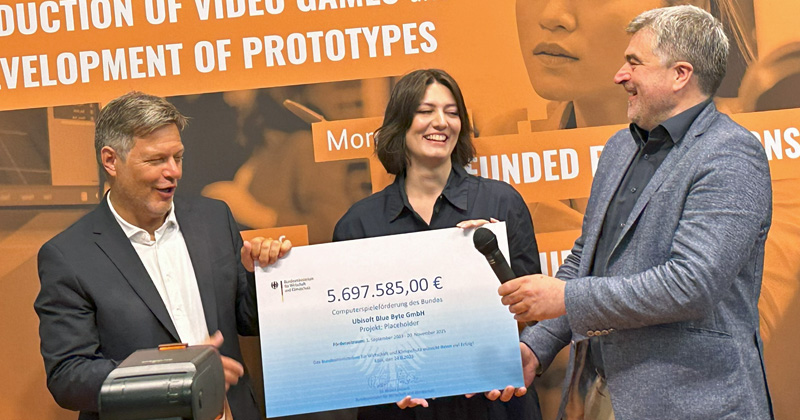Advertisement
The Federal Audit Office has analyzed the Ministry of Economic Affairs' games funding – and has hardly any good to say about the practice to date.
The 28 pages comprise “Final communication“, which the Federal Audit Office published this week (PDFIn it, the Bonn-based supervisory authority takes a close look at the federal government's computer games funding, which was initiated by the then Transport Minister Andreas Scheuer (CSU) in autumn 2019 and has been the responsibility of Economics Minister Robert Habeck (Greens) since the 2021 federal election.
There are currently exactly 570 projects in the federal subsidy database – grants of between €1.5 and €5.7 million are planned for 30 games (overview). There has been a freeze on applications since May 2023 because the funding pots were exhausted prematurely. The situation remains unchanged as the budget for 2024 does not provide for any additional funding – contrary to the €125 million demand of the industry association Game.

Advertisement
The result is that until further notice, only tranches that have already been promised will be paid out – funding for new projects, however, is on hold. In anticipation of a possible resumption in 2025, the Federal Ministry for Economic Affairs and Climate Protection (BMWK) is working on a 'further development' of the program.
But are the subsidies currently in the hundreds of millions actually having the intended effect? with regard to studio start-ups, investments, product quality and international competitiveness? These are precisely the questions regarding “Regularity and economy” The Court of Auditors has also asked itself this question – and has come to remarkable conclusions.

The auditors have surprisingly clear, because very fundamental, doubts about the formal responsibility of the federal government. Because promoting the economy – here: supporting games companies – is “Basically a responsibility of the states”. The Court of Auditors’ expectations: “If the financing competence is not present, federal funding must be discontinued.”
The Ministry of Economic Affairs has obviously already reacted to this open flank and wants to hold the states much more accountable than before in the future – there is strong protest from the state chancelleries in Düsseldorf, Munich and Berlin.
The Court of Auditors considers it problematic that the subsidies are “non-repayable grants” are designed. In other words: The studios are allowed to keep the money – regardless of whether the game recoups many times its costs. What’s more, the Court of Auditors has concluded, based on the individual cases examined, that “Computer games can also be produced with economic success in Germany.” Consequence: In order to be able to reclaim economically unjustified grants, only “conditionally repayable grants” take place.
The auditors also take a critical look at the funding rate: For development budgets of up to €2 million, the state covers half of the costs – for more complex and therefore more expensive games, the rate drops to 25 percent. The studios must therefore prove and raise their own contribution of between 50 and 75 percent.
As luck would have it, the lion’s share of projects applied for the maximum funding rate – which inevitably entails the risk of “Free-rider effects” which has been pointed out several times by 'Games Minister' Habeck and Finance Minister Christian Lindner (FDP). Not every project is therefore dependent on subsidies. The economic performance of the companies must therefore “significantly more intense” than before – also with the aim of ensuring that many more studios can benefit from the funding than before.

One of the weaknesses of state funding for computer games that has already been identified in this context is the so-called first-come, first-served principle: Until now, applications were processed in the order in which they were submitted – anyone who came too late was left empty-handed. The application freeze without warning has led to moderate, sometimes existential, disruptions, particularly for start-ups and small studios with little equity. The Federal Audit Office is calling for fixed deadlines – also with the aim of being able to choose from the most promising applications afterwards.
Finally, the Court of Auditors calls for the formulation of clear key figures in order to be able to seriously assess games funding during the year: “An accompanying performance review of the funding program with a review of target achievement, impact and cost-effectiveness has not been carried out for the funding that has now been running for five years.”
Despite the statements already made by the Ministry of Economic Affairs, questions remain unanswered at the Federal Audit Office. Concrete answers to the “numerous complaints” In Bonn, the draft of the new funding guidelines is expected to be presented by the Ministry in good time before the deliberations of the Budget Committee in the autumn.
Not part of the audit report is a €100 million games funding package for the years 2024 to 2026, which the Bundestag has parked with the Commissioner for Culture and Media (BKM): At the moment there are no indications as to what the concrete concept looks like and when Claudia Roth's (Greens) office can start paying out.
